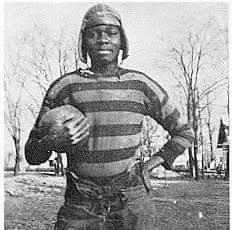
In 1934, Zik was disqualified from representing Nigeria at the British Empire Games which took place that year by the Amateur Athletics Association (AAA) of Great Britain.
It could be recalled that as part of his drive to challenge racism frontally he earlier wrote to the Colonial office in 1932 to represent Nigeria at the Los Angeles Olympics which was known as The Games of the X Olympiad.
Prior to that event, Zik excelled in many sporting events including Welterweight Boxing Champion Storer College USA (1925–27); High Jump champion, Howard University Inter-Scholastic Games (1926); and Gold Medalist in Cross Country, Storer College USA (1927).
So while in England en route to Ghana from the U.S. he decided to participate in the Empire Games. Seeing the opportunity to represent Nigeria, he applied to compete in the Mile and One-Half Race and the High Jump.
He was confident he could do the mile in less than 4:30, having been a successful collegiate athlete in America. But the South African contingent under the apartheid government led a vehement protest that Zik should not be allowed to participate in the games because he was not properly registered as a Nigerian athlete.
Zik however felt slighted by the protest, and why South Africa of all countries, he asked. Believing that their protests were borne out of the fact that they couldn’t imagine competing against a Blackman, Zik responded in the most unusual manner.
He protested by saying “that the games were not the arena for interracial and international fellowship that they were touted to be.”
He went ahead to drop his English name Benjamin, and changed his name legally in a London publication to Nnamdi Azikiwe, adding that “if he was an ‘extraneous element’ in England because of his color, he could do without his English name.”
He then started preaching against the use of English names by Nigerians. That led other nationalists to drop their English names.
From then, he diverted his spirit of sportsmanship that the British cherished into his political activities and anti-colonial work.
Thus, his adoption of his first indigenous name, ‘Nnamdi’, no doubt represented a political conversion towards an African identity. Generally, the ideals of pan-Africanism as espoused by Nnamdi Azikiwe are highlighted in his book, Renascent Africa, first published in 1937.
The central theme of the book is Azikiwe’s philosophy of a new Africa, with emphasis on respect for humanity and dignity of the black man wherever he may be found. Nnamdi Azikiwe underpinned his philosophy of New Africa into five major areas; he felt if actualized by Africans could lead to the desired socio-cultural, political and economic emancipation of the continent.
Thus the five main focus of his philosophy of a New Africa are (i) Spiritual balance (ii) Social Regeneration (iii) Economic determinism, (iv) Mental emancipation; and (v) Political Risorgimento or resurgence.
Happy Posthumous Birthday to The Zik of Africa.
He would have been 116 today.